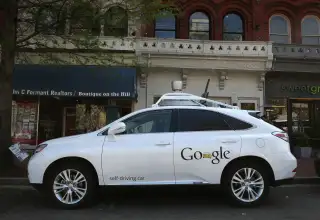Self-Driving Cars Could Soon Save the Average Family at Least $5,600 a Year

A new report says that the self-driving car revolution will arrive quicker than most people think, and it will save people a significant amount of money year after year.
The report was published by RethinkX, an "independent think tank" created by James Arbib, a London-based venture investor, along with serial entrepreneur and author Tony Seba. It says that as self-driving vehicles become common, most people will stop owning cars and instead pay by the ride for Uber-like on-demand autonomous electric vehicles. Doing so could save a family more than $5,600 a year — equivalent to a wage raise of 10% for the median American household.
"This will keep an additional $1 trillion per year in Americans’ pockets by 2030, potentially generating the largest infusion of consumer spending in history," the report says.
The report estimates that as soon as 2030, 95% of all the miles you travel on the road will be inside self-driving electric vehicle services. Instead of individual drivers owning their own vehicles, the cars will be owned as fleets by companies, in a new business model the report's authors call “transport-as-a-service” (TaaS).
For evidence that this is already occurring, the report cites Tesla’s recent announcement about the development of its own ridesharing platform as well as news like GM’s $500 million investment in Lyft, BMW’s ridesharing service, ReachNow, and Volkswagen’s $300 million investment in Uber competitor Gett.
At the moment, owning a car entails the upfront purchase plus the ongoing costs of using them. Under the regime envisioned in the new report, all of these costs will be replaced by single per-usage charges. The reports' authors estimate, "conservatively," that these charges will be two to 10-times cheaper than operating your own vehicle — "and likely far cheaper than that as technologies improve."
The researchers picture an "intensely competitive environment" full of businesses eager to capture as many customers as possible as the transition to self-driving car services begins. "Businesses will offer services at a price trending toward cost," the report explains, and the cheap prices will speed the pace at which consumers will give up their cars and use autonomous taxis instead. "Nearly 100 million existing vehicles will be abandoned as they become economically unviable."
While the paper has a bit of blue-sky thinking to it, examples of their vision can already be found in places like Helsinki, where public officials have vowed to make car ownership obsolete by 2025. Even here in the U.S., the mayor of Miami-Dade county recently said he would be in favor of shelving an ambitious railway plan on the theory that autonomous vehicles will prove less costly.
“Rapid-transit vehicles don’t necessarily have to be on rail,” Mayor Carlos Gimenez said. "New technology is coming. And that new technology may have tremendous consequences. Automated cars, but also automated buses.”